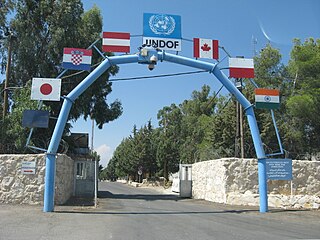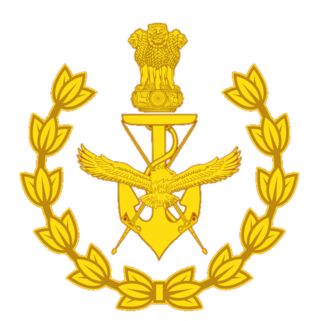
The United Nations Truce Supervision Organization (UNTSO) is an organization founded on 29 May 1948 for peacekeeping in the Middle East. Established amidst the 1948 Arab–Israeli War, its primary task was initially to provide the military command structure to the peacekeeping forces in the Middle East to enable the peacekeepers to observe and maintain the ceasefire, and in assisting the parties to the Armistice Agreements in the supervision of the application and observance of the terms of those Agreements. The organization's structure and role has evolved over time as a result of the various conflicts in the region and at times UNTSO personnel have been used to rapidly deploy to other areas of the Middle East in support of other United Nations operations. The command structure of the UNTSO was maintained to cover the later peacekeeping organisations of the United Nations Disengagement Observer Force (UNDOF) and the United Nations Interim Force in Lebanon (UNIFIL) to which UNTSO continues to provide military observers.

The United Nations Organization Stabilization Mission in the Democratic Republic of the Congo, or MONUSCO, is a United Nations peacekeeping force in the Democratic Republic of the Congo (DRC). At the request of the DRC's government, it is withdrawing completely from the country by the end of 2024.

The United Nations Mission in Liberia (UNMIL) was a United Nations peacekeeping operation established in September 2003 to monitor a ceasefire agreement in Liberia following the resignation of President Charles Taylor and the conclusion of the Second Liberian Civil War (1999–2003). At its peak it consisted of up to 15,000 UN military personnel and 1,115 police officers, along with civilian political advisors and aid workers.

The United Nations Disengagement Observer Force (UNDOF) is a United Nations peacekeeping mission tasked with maintaining the ceasefire between Israel and Syria in the aftermath of the 1973 Yom Kippur War. The mission was established by United Nations Security Council Resolution 350 on 31 May 1974, to implement Resolution 338 (1973) which called for an immediate ceasefire and implementation of United Nations Security Council Resolution 242.
Major General Wolfgang Jilke served as Force Commander of the United Nations Disengagement Observer Force (UNDOF). He was appointed to this position by United Nations Secretary-General Ban Ki-moon in January 2007, succeeding Lieutenant General Bala Nanda Sharma of Nepal, who relinquished his post on 17 January 2007.
India was among the charter members of the United Nations that signed the Declaration by United Nations at Washington, D.C., on 1 January 1942 and also participated in the United Nations Conference on International Organization at San Francisco from 25 April to 26 June 1945. As a founding member of the United Nations, India strongly supports the purposes and principles of the UN and has made significant contributions in implementing the goals of the Charter, and the evolution of the UN's specialised programmes and agencies. In 1947, the United Nations Information Centre (UNIC) in New Delhi became the first United Nations office in independent India.

United Nations Security Council resolution 1243, adopted unanimously on 27 May 1999, after considering a report by the Secretary-General Kofi Annan regarding the United Nations Disengagement Observer Force (UNDOF), the Council extended its mandate for a further six months until 30 November 1999.

United Nations Security Council Resolution 1934, adopted unanimously on June 30, 2010, after considering a report by the Secretary-General Ban Ki-moon regarding the United Nations Disengagement Observer Force (UNDOF), the Council extended its mandate for a further six months until December 31, 2010.

United Nations Security Council resolution 1550, adopted unanimously on 29 June 2004, after considering a report by the Secretary-General Kofi Annan regarding the United Nations Disengagement Observer Force (UNDOF), the Council extended its mandate for a further six months until 31 December 2004.

United Nations Security Council resolution 1578, adopted unanimously on 15 December 2004, after considering a report by the Secretary-General Kofi Annan regarding the United Nations Disengagement Observer Force (UNDOF), the Council extended its mandate for a further six months until 30 June 2005.

United Nations Security Council Resolution 1965, adopted unanimously on December 22, 2010, after considering a report by the Secretary-General Ban Ki-moon regarding the United Nations Disengagement Observer Force (UNDOF), the Council extended its mandate for a further six months until June 30, 2011.

United Nations Security Council resolution 1605, adopted unanimously on 17 June 2005, after considering a report by the Secretary-General Kofi Annan regarding the United Nations Disengagement Observer Force (UNDOF), the Council extended its mandate for a further six months until 31 December 2005.

United Nations Security Council Resolution 1648, adopted unanimously on 21 December 2005, after considering a report by the Secretary-General Kofi Annan regarding the United Nations Disengagement Observer Force (UNDOF), the Council extended its mandate for a further six months until 30 June 2006.

Natalio Cabili Ecarma III is a Filipino General who recently served as Undersecretary of the Department of National Defense of the Republic of the Philippines. He is known for being the first Filipino appointed by UN Secretary-General Ban Ki-moon, to serve as Head of Mission and Force Commander of the United Nations Disengagement Observer Force in the Golan Heights, giving him the distinction of being the first Filipino to head a United Nations Peacekeeping Mission, with the rank of UN Assistant Secretary General.

General Purna Chandra Thapa was the Chief of Army Staff in the Nepalese Army until 2021. He served as the Head of Mission and Force Commander of the United Nations Disengagement Observer Force from 19 January 2015 until 7 February 2016.
Major General Wang Xiaojun is a Chinese military officer and diplomat who served as the Force Commander of the United Nations Mission for Referendum in Western Sahara. Prior to this appointment of 8 December 2016 by United Nations Secretary-General Ban Ki-moon, Major General Wang Xiaojun served as the Defence Attaché at several embassies of the People's Republic of China including to Brazil, India, Sweden and the United States.

Rannvijay Singha is an Indian film actor, television personality, host, and VJ. He is known for his role in MTV Roadies. He was a part of the show from 2004 to 2020, earlier as a gang leader and then as a host. He was also a part of the auditions judging panel from season 8 to season 18 and a gang leader.

The Integrated Defence Staff (IDS) is an organisation responsible for fostering coordination and enabling prioritisation across the different branches of the Indian Armed Forces. It is composed of representatives from the Indian Army, Indian Navy, Indian Air Force, Ministry of External Affairs, Defence Research and Development Organisation (DRDO), Ministry of Defence and Ministry of Finance. The IDS is headed by Chief of Integrated Defence Staff along with Deputy Chiefs of Integrated Defence Staff. On December 24, 2019, the Cabinet Committee on Security (CCS) established the post of Chief of Defence Staff, a four-star general, a tri-service Chief, that shall lead the defence forces as well as play the role of head of the Department of Military Affairs. The body advises and assists the Chief of Defence Staff.

Major General Maureen O'Brien is an Irish Army general and current Deputy Military Advisor in the United Nations Office of Military Affairs, Department of Peace Operations. O'Brien had previously been Deputy Force Commander of the United Nations Disengagement Observer Force (UNDOF) in the Golan Heights from September 2019 to March 2021.

Department of Military Affairs (DMA) is the department in charge of military matters within the Indian Ministry of Defence. Headed by the Chief of Defence Staff, as its ex-officio secretary, the DMA provides integration between the armed forces of the Union and the Ministry of Defence.














